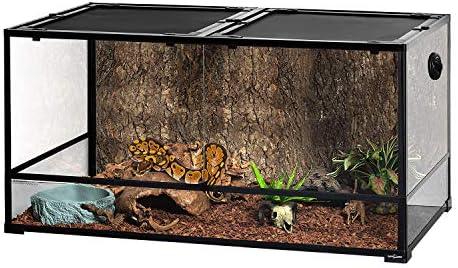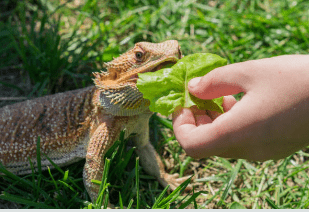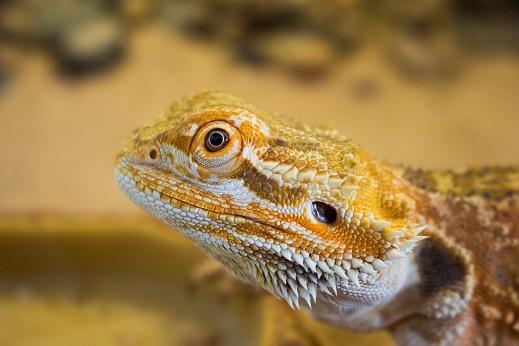Alright, all you lizard lovers and curious creatures out there, listen up!
I’m no stranger to the intricate world of reptiles, in fact, I’m an expert in the field. And today, we’re going to debunk the mystery: are bearded dragons good pets?
They’re cute, they’re quirky, but are they the perfect match for your home?
Stick around, and let’s dive deep into the qualities, care requirements, and perks of having a bearded dragon as a pet.
Maybe you’ve seen a friend’s bearded dragon chillin’ in its terrarium and thought, “Wow, I want one.”
Well, it’s time to make an educated decision.
So buckle up, this is a comprehensive guide that leaves no rock unturned (literally, they love rocks).
Table of Contents
Characteristics and Temperament
Let’s start by decoding the personality of this fascinating creature. Bearded dragons have characteristics that may make you wonder why you hadn’t adopted one sooner. But first, let’s dissect what makes them tick.
Docile Nature
You won’t find a rowdy rebel here. Bearded dragons are generally docile, making them easy to handle, especially for beginners.
Friendly and Sociable
These dragons love good company. They tend to be friendly and enjoy the occasional shoulder ride around the house.
Tolerance for Handling
No drama with these fellas. Most are tolerant of handling, although young ones might need some time to get used to it.
Curiosity and Alertness
Curiosity didn’t kill the dragon! They’re alert, aware of their surroundings, and quite the explorers.
Mild-mannered
Not hot-headed like Smaug from ‘The Hobbit.’ They are generally mild-mannered and easy to please.
Temperament Variations
Individual personalities do vary. Some might be chill, while others are a bit more, let’s say, spirited.
Tolerance to Interaction
You can comfortably engage with them. However, remember they’re not dogs; their tolerance to interaction has its limits.
Displaying Behaviors
They have a variety of expressive behaviors like puffing their beards and waving, which is delightful to watch.
Responding to Human Presence
Generally, they respond well to humans. Some even seem to recognize their owners, which is adorable.
Communication
While they don’t talk, their body language speaks volumes. Understanding their cues can be quite entertaining.
Care Requirements
So, they’ve got personality. But are bearded dragons good pets when it comes to their care? Let’s dive in.
Enclosure
An ideal home for your bearded buddy should be spacious and stimulating. A 40-gallon tank suffices for an adult. Remember, bigger is usually better; it lets them explore and stretch those scaly legs. Ensure it’s well-ventilated and safe from potential hazards.

Lighting and Heating
Ah, the sunbathing lovers! Bearded dragons hail from the hot Australian deserts, so they cherish their basking sessions. A UVB light is essential, aiding in calcium absorption and overall health. Also, include a basking light to warm their bones.
Substrate
“Are bearded dragons good pets in terms of maintenance?” you ask. Well, their substrate plays a role. Forget sand, which poses ingestion risks. Opt for newspaper, reptile carpet, or tiles. These are easy to clean and safer for your pet.
Temperature Regulation
Let’s keep it tropical. A gradient from 95°F in the basking area to about 85°F in the cooler region keeps them content. Nighttime temperatures should hover around 70°F.
Humidity
Too wet? No thanks. Maintain a humidity level of about 30-40%. Overly damp conditions can lead to fungal infections.
Diet
Their varied diet is what often makes people think, “Bearded dragons are good pets.” They munch on both veggies and insects. As they age, the ratio leans more towards vegetables.

Feeding Schedule
Feed the younglings daily; adults can be fed every other day. And yes, they do love their food dance when it’s chow time.
Water Source
Hydration, hydration, hydration. Fresh water should always be available. Some love to wade in shallow dishes too.
Hygiene and Cleaning
A clean dragon is a happy dragon. Remove waste daily and thoroughly clean their abode every month. Hygiene plays a pivotal role if you want your bearded dragons as good pets.
Veterinary Care
Regular check-ups ensure your pet is in top shape. Also, be on the lookout for signs of illness.
Interactions and Companionship
Bearded dragons, contrary to their fierce name, are sociable pets. The bond between the owner and the dragon can be fulfilling.
Bonding with Owners
When they start recognizing you as the food provider and protector, a bond forms. Interacting regularly strengthens this bond.
Social Interaction
While they might not play fetch, bearded dragons do enjoy watching the world around them, and often seem to recognize different family members.
Display of Affection
This is a dragon’s way of saying “I love you”. Whether it’s a gentle head bob or them scurrying towards you, their subtle displays of affection are heartwarming.
Calm and Relaxing Presence
There’s an inexplicable calmness in watching them laze or explore. For many, it’s therapeutic. Their tranquil nature does make you think, “Bearded dragons are a good pets.”
Educational and Therapeutic Benefits
There’s more to these scaly buddies than meets the eye. Their presence offers a myriad of learning and therapeutic experiences.
Learning Opportunity
Be it their diet, behavior, or shedding process, bearded dragons offer a crash course in reptilian biology.
Responsibility and Nurturing Skills
Owning a pet is a commitment. It teaches responsibility, routine, and care, especially beneficial for young ones.
Introduction to Conservation
Through them, you can introduce the concepts of wildlife conservation and the importance of preserving ecosystems.
Stress Reduction and Relaxation
As earlier mentioned, their mere presence and activities can be a stress buster. No wonder many believe that bearded dragons are good pets.
Emotional Support
Pets, in general, offer emotional support. The silent but comforting presence of a bearded dragon can make a difference on tough days.
Considerations and Precautions
While the jury may still be out on whether “bearded dragons are good pets,” there are certain aspects to mull over. After all, owning a pet is not just about the Instagrammable moments, right?
Space Requirements
Before diving in, gauge your available space. A 40-gallon tank is the minimum, and it needs a designated spot. A cramped space can lead to stress for your dragon and you, which is hardly ideal.
Financial Commitment
These critters come with a price tag, not just the initial cost but the ongoing care. You have to account for the enclosure, lighting, and diet, not to mention potential vet bills. So, get those wallets ready!
Time Commitment
Nope, they’re not just décor. Bearded dragons need social interaction, feeding, and a clean environment. If time’s a luxury you don’t have, reconsider your pet choices.
Lifespan and Long-Term Commitment
With a lifespan that can extend beyond a decade, these aren’t short-term roommates. Longevity is both a pro and a con when pondering if bearded dragons are good pets.
Handling and Safety
They’re generally amiable but can get startled or stressed. Proper handling techniques are essential. For instance, support their belly and legs when lifting them up. Always wash your hands afterward.
Enclosure Maintenance
“Are bearded dragons good pets for neat freaks?” is a valid question. Their enclosure requires weekly cleaning, including substrate changes and sanitization, to prevent bacterial growth.
Potential Health Issues
It’s not all sunshine and rainbows. Be prepared for potential health issues like metabolic bone disease or respiratory infections. Regular vet check-ups are key.
Children and Pet Interactions
These scaly friends can be great for children but under supervision. Teach kids to handle them gently. They are not squeezing toys, after all.
Allergies and Sensitivities
Thankfully, bearded dragons are low on the allergen scale. However, if you’re sensitive to dander or reptile bedding materials, proceed with caution.
Legal Considerations
Last but not least, make sure it’s legal to own a bearded dragon in your area. Some places require a permit, and violating these laws can result in fines or even confiscation of your pet.
So, Are Bearded Dragons Good Pets? Pros and Cons Table
Let’s sum it up, shall we? Here are the pros and cons laid out for your easy reference.
Pros:
- Docile and Gentle Temperament: They’re often described as the “puppies of the reptile world” because of their calm nature.
- Friendly and Sociable: Bearded dragons often enjoy the company of their human caregivers and may even “wave” or “head-bob” in greeting.
- Tolerance for Handling: Unlike some other reptiles, most are comfortable being held.
- Curious and Alert Behavior: You’ll have as much fun watching them as they’ll have exploring their environment.
- Child and Pet-Friendly: Generally tolerant of children and other pets, making them family-friendly options.
- Bonding Potential: With time and interaction, many owners find their bearded dragons form a unique bond with them.
- Educational Value: They’re an excellent way to introduce children (and adults!) to the fundamentals of reptile biology and care.
- Therapeutic Benefits: The mere act of observing or interacting with your dragon can reduce stress levels.
- Low Noise and Odor: No barking or cat litter to worry about here!
- Entertainment Factor: Whether it’s climbing, exploring, or simply basking, they’re endlessly fascinating.
- Lifespan: With proper care, expect a companion for 10 to 15 years.
- Low Allergenic Potential: They don’t have fur or feathers that can trigger allergies.
- Calm and Relaxing Presence: Their slow movements and steady gaze can be surprisingly calming.
- Educational for Children: Teaches children about responsibility and care for living beings.
- Availability of Captive-Bred: Easier to care for and less likely to carry diseases compared to wild-caught.
Cons:
- Initial Setup Cost: The habitat setup and initial purchase can be quite expensive.
- Time Commitment: They need a fair amount of daily interaction and care.
- Space Requirements: A large enclosure is non-negotiable.
- Handling Caution: Incorrect handling can lead to stress or injury.
- Maintenance: Regular cleaning is a must.
- Health Concerns: Like any pet, they have their own set of potential health issues.
- Long-Term Commitment: Think long-term; these pets can live for more than a decade.
- Allergy Concerns: Some people might react to the bedding or the lizards themselves.
- Climate Control: Specific temperature and humidity levels are required.
- Lighting Requirements: Proper UVB lighting is essential for their well-being.
- Limited Lifespan: Compared to some pets like parrots or tortoises, their lifespan is more limited.
- Waste Management: Yes, there will be poop.
- Same-species Aggression: Usually better off housed alone.
- Stress Factors: Changes in the environment can stress them out.
- Legal Constraints: Ensure they’re legal in your jurisdiction.
| Pros | Cons |
| Docile and Gentle | Initial Setup Cost |
| Friendly and Sociable | Time Commitment |
| Tolerant of Handling | Space Requirements |
| Curious and Alert | Handling Caution |
| Child and Pet-Friendly | Regular Maintenance |
| Bonding Potential | Potential Health Issues |
| Educational Value | Long-term Commitment |
| Therapeutic Benefits | Allergy Concerns |
| Low Noise and Odor | Climate Control |
| Entertaining | Lighting Requirements |
| Available as Captive-Bred | Legal Constraints |
| Long Lifespan | Limited Lifespan |
Conclusion
So there you have it, the complete lowdown on whether bearded dragons make good pets. They’re charming, relatively easy to care for, and offer a bunch of unexpected benefits.
If you’ve got the time, space, and commitment, a bearded dragon can be an excellent addition to your life. Now the ball’s in your court. Make an informed choice and perhaps welcome a scaly, lovable creature into your home!
FAQs
How easy is it to care for a bearded dragon?
Bearded dragons have moderate care requirements, needing a specific habitat setup, diet, and temperature regulation. However, once the setup is complete, daily maintenance is relatively straightforward.
Are bearded dragons good pets for children?
Yes, bearded dragons are generally tolerant of children and can be a great educational experience. However, adult supervision is recommended during interactions to ensure the safety of both the child and the pet.
Do bearded dragons need a lot of space?
A fully-grown bearded dragon requires a minimum of a 40-gallon tank, so they do need a reasonable amount of space. Make sure to plan accordingly to provide them with a suitable living environment.
Alina Hartley is a small-town girl with a ginormous love of bearded dragons. It all started with Winchester, a baby bearded who was abandoned at the shelter by his former owners because of a birth defect that caused one front leg to be shorter than the other. Alina originally went to the shelter looking for a guinea pig, but one look at Winchester and it was love at first sight. From that day on, Alina has dedicated her life to learning everything she can about bearded dragons. She loves helping new beardie parents start their incredible journey with these magnificent reptiles.
Follow her on:
LINKEDIN
TWITTER.
Read her latest articles HERE
Learn more about her HERE.

